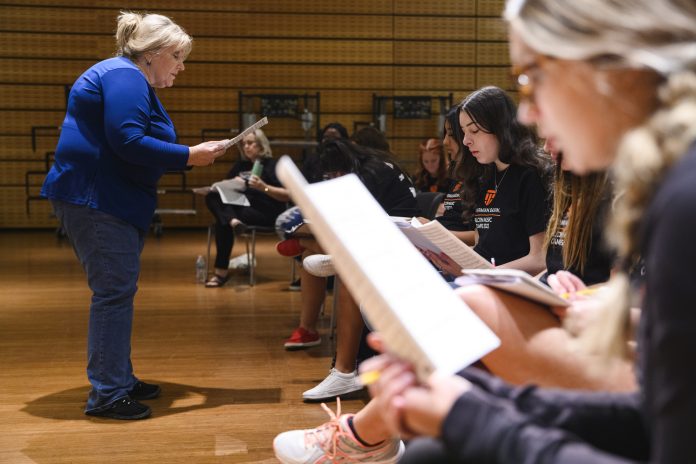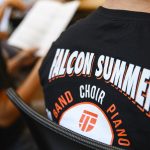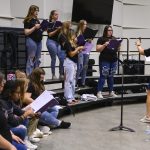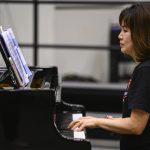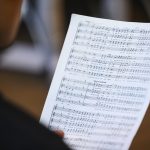Students in the fine arts are some of the nicest and most motivated people on their campuses, Frank Eychaner, associate professor at University of Texas Permian Basin said.
Eychaner hosted the two-day Small School Choir Camp Monday and Tuesday at the Wagner Noel Performing Arts Center. About 65 students from Andrews, Monahans, Fort Stockton, Compass Academy Charter School, Brownfield and Sweetwater participated.
Students who attend the camp always walk away with a “really great choral experience,” Eychaner said.
“They get a chance to work with some of the finest directors in our area. They get to work with other students who are super-motivated to do the same things that they love. Oftentimes, the students that want to audition for all-state are some of the best singers and most committed people in their program …,” he added.
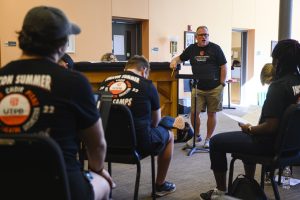
Eychaner said many of these students would call themselves “choir kids.”
“… It’s their primary activity; not all but for them to have the opportunity to get together with other like-minded students and work intensely for a couple of days. It really helps them. Many of these kids will go on to sing in college,” and they’ll earn college scholarships because they have a unique skill set that is really valuable, Eychaner said.
He added that the process of making music together makes them better people.
“… It sounds trite, but kids that are in choir, band and orchestra are not picking up handguns and making the social connections are powerful. They develop making music with others; oftentimes others who have different perspectives than them. (It) helps them develop empathy. It helps them develop compassion. It helps them develop really powerful ways to deal with the emotional challenges that we all experience.”
“Making music gives helps them give voice to those feelings in a positive and proactive way, as opposed to you know it building up until, you know there’s a crisis of some kind. These people are some of the nicest, kindest other-focused students in their school because that’s what the arts brings. It makes them better people by virtue of making beautiful music together in an environment with other people,” Eychaner said.
The small school camp is just two days and usually has 75 to 80 students.
“… Normally we have a contingency from Big Spring, but they weren’t able to come this year … Our usual number for this camp is about 75 to 80. But again, like the other camps, (we have) not totally recovered for COVID,” Eychaner said.
A lot of the same methods are used with the large and small school campus.
“Many of the techniques are going to be the same because as they say, the fundamentals don’t change. We’re teaching great posture. We’re teaching great breathing techniques. We’re teaching the students how to use their voices to sing beautifully in every register. We’re teaching them how to sight read well. We’re teaching them how to be musical; (We’re) are teaching them how to interpret texts. Those are going to be the same whether I’m teaching a sixth-grader or a college student,” Eychaner said.
“What does change is the music. Of course, the small school repertoire is different music. It’s designed for a different constituency of students who have a different skill set, so it doesn’t tend to have as extreme of ranges. It tends to be less divisi because the students that go through our small school programs, they don’t sing that complex of a repertoire. It’s the same principle. We don’t ask our 3 and 4 A high school football teams to play the 6A teams. Because when you take the best players in a school of 400, you’re obviously going to have a different product than if you take the best 12 players from a school of 4,000. So it’s the same principle. The music is designed to help them be really successful. It’s challenging for them, but it’s a different challenge than it would be for the for the large school choirs,” Eychaner said.
He added that they were fortunate to have some incredible section leaders. Mr. Michael Matlock is the head director at Andrews. He’s leading our tenors. Gabriel Sanchez, who is a UTPB graduate, … is the assistant director at the high school in Andrews. He’s leading our bass sectional. Ms. Billie Lou Billett is assistant in Monahans; long, long career very, very successful choirs all across West Texas. Our soprano section leader is Ms. Whitney Ellison. She is actually (at) the middle school in Andrews, but she’s just a straight-up fantastic teacher. So really pleased to have them,” Eychaner said.
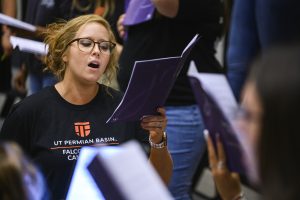
Each section has a couple of UTPB upper-division students who are sitting in, singing, helping and coaching individual students.
“We add additional value to the camp by asking a couple of our vocal vocal faculty, Dr. Rachelle Woolston, and Mr. David Corman to pull the students out throughout the week to teach individual lessons so that the kids get a chance to get some in-depth study in their own voice. It’s very helpful for them,” Eychaner said.
Meri Jane Cargile, the middle and high school choir director at Brownfield, is in her fifth year at school and her third year coming to camp.
“… I am rebuilding the choir program and so it has helped me a lot. When I came, there were very few kids in choir. And we’re up to about 150 now between both campuses. So it has built the excitement and the musicality for for the students,” Cargile said.
“I think the easiest way to put it is when you’re in a small school and you don’t see other people singing as much when you come to something like this, it gives you a vision for what could be,” she added.
She bought six students Tuesday.
She added that the camp is a long way from Brownfield.
“There are camps that are closer, but I find this one … more personable. Dr. Eychaner is just fabulous. He interacts with the students so well,” Cargile said.
It is a smaller campus than Texas Tech, for example, but the quality of instruction is fabulous, she added. The students also get to meet other peers from smaller schools.
Omar Guerrero, head choir director at Fort Stockton middle and high school, said there are about 50 in the high school program and about 80 in middle school.
As a new teacher, Guerrero said the camp has been great for him because he’s able to see how other teachers from around the area ply their craft.
“I’ve been going in and out of different sessions of different sections — tenors, basses, altos, sopranos. They are all very effective in the way that they teach and my students are getting to sing with other singers that love to sing just as much as they do,” Guerrero said.
He added that this is the first time some of his students have been able to attend camp because of COVID.
Guerrero said he can already tell the camp is helping his students.
“The kids that decide to come are usually the ones that are at the top of my choir. They’re the best singers in the choir and now they get to be around other singers; other great singers; a little more competition. Hopefully, they’re all regional auditions will go well. But at least this will make them work a little harder knowing that there’s other singers out there just as good as them if not better,” Guerrero said.
Daeja Dominguez, a 16-year-old Fort Stockton junior said, this is the first time she has attended one of the camps.
Dominguez said it was cool because when she did all-region before, she had to learn music on her own, so this is helping her learn the music.
She added that she likes being around students who are just as good as she is.
Dominguez said the experience will make her feel more confident when she auditions during the quest for state.
Kireima Garcia Johnson, a 16-year-old from Monahans High School, Ave Magill, a 15 year old from Andrews High School, and Christyn Allen, 17, from Sweetwater High School are all glad they were part of the camp.
“I think it takes something hard and abnormal that we do (and) makes us more competent to go in front of a judge,” Allen said.

